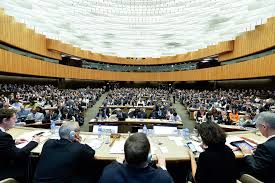A
new initiative to build climate resilience in the world’s most vulnerable
countries has been launched by UN Secretary-General Ban Ki-moon and 13 members
within the UN system at COP21, the Paris Climate Conference.
The new initiative will strengthen the ability of
countries to anticipate hazards, absorb shocks, and reshape development to
reduce climate risks.
The
newly announced initiative, the UN Secretary-General’s Climate
Resilience Initiative — Anticipate, Absorb, Reshape — will help address
the needs of the nearly 634 million people, or a tenth of the global
population who live in at-risk coastal areas just a few meters above existing
sea levels, as well as those living in areas at risk of droughts and floods.
The world is now experiencing a strong El Niño event,
which could place as many as 4.7 million people at risk from drought in the
Pacific alone.
Bringing
together private sector organizations, governments, UN agencies, research
institutions and other stakeholders to scale up transformative solutions, the
SG’s Resilience Initiative will focus on the most vulnerable people and
communities in Small Island Developing States, Least Developed Countries, and
African countries.
Over
the next five years, the Initiative will mobilize financing and knowledge;
create and operationalize partnerships at scale, help coordinate activities to
help reach tangible results, catalyse research, and develop new tools.
The Secretary-General’s
Climate Resilience
Initiative
will support the work of partners, such as the Africa Risk Capacity, to ensure
that by the time the new climate agreement enters into force in 2020,
over 30 countries are provided with $2 billion in coverage against drought,
flood and cyclones, including $500 million in adaptation financing.
150 million Africans will be indirectly insured.
While much of the attention at Paris is focused on
reducing emissions in a bid to keep global temperature rise to less than two
degrees Celsius by the end of the century, many climate impacts will continue
to increase—including rising sea level and more extreme weather events—even if
greenhouse emissions cease, according to the Intergovernmental Panel on Climate
Change.
A recent report issued by the UN shows that over the
last twenty years, 90 per cent of major disasters have been caused by 6,457
recorded floods, storms, heatwaves, droughts and other weather-related events.
Secretary-General Ban Ki-moon said, “These are the
people who did the least to cause climate change, yet they stand to lose their
homes, their jobs, and even their lives because of the growing impacts of
climate change. That is why I have asked the UN system to put together a
package of initiatives to address this urgent need.”
“The Secretary-General’s Climate Resilience Initiative
signals a new era in how the United Nations and its agencies think about our
global future, said Dr. Judith Rodin, author of The Resilience Dividend
and president of The Rockefeller Foundation, which has made pioneering
investments of more than a half-billion dollars to build resilience globally
over the past decade. “Crisis is the new normal, and our world demands that we
seek solutions that solve multiple problems at once, for the greatest number of
people, while strengthening the fabric of their communities, economies, and
lives.”
The 13 UN entities participating in the Initiative are FAO, UNEP, UNFCCC, UN-
Habitat, UNICEF, UNESCO, UNFPA, UNOPS, UNISDR, WFP, OCHA, WHO, and WMO.





























